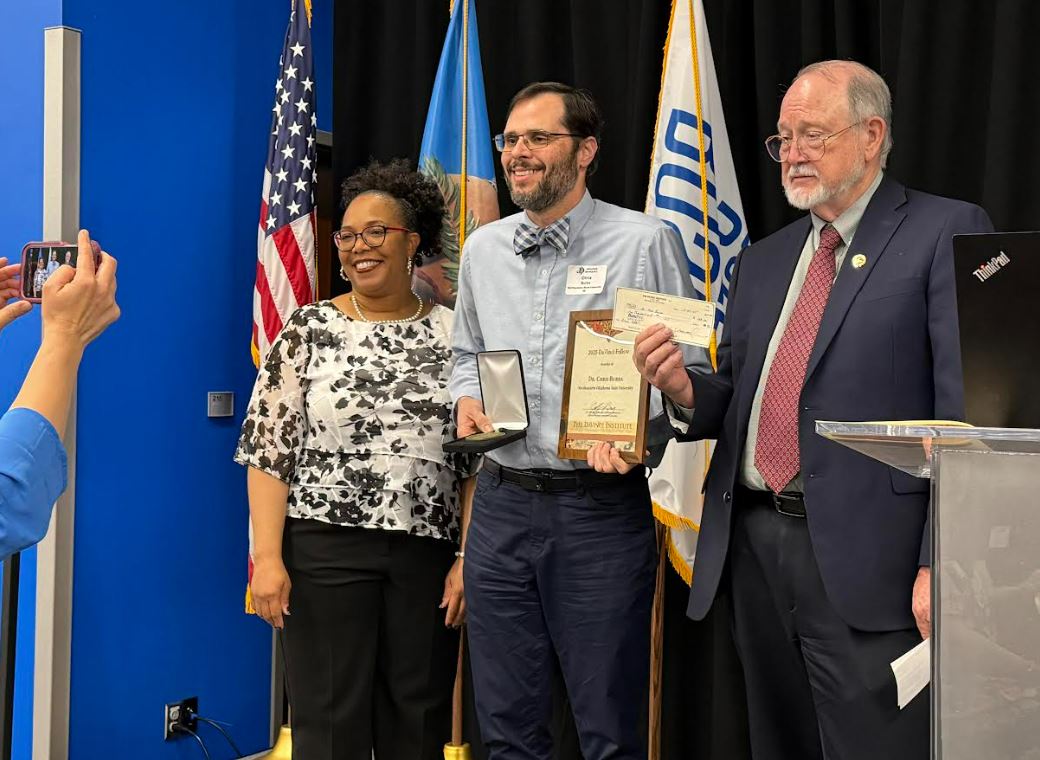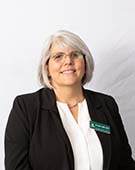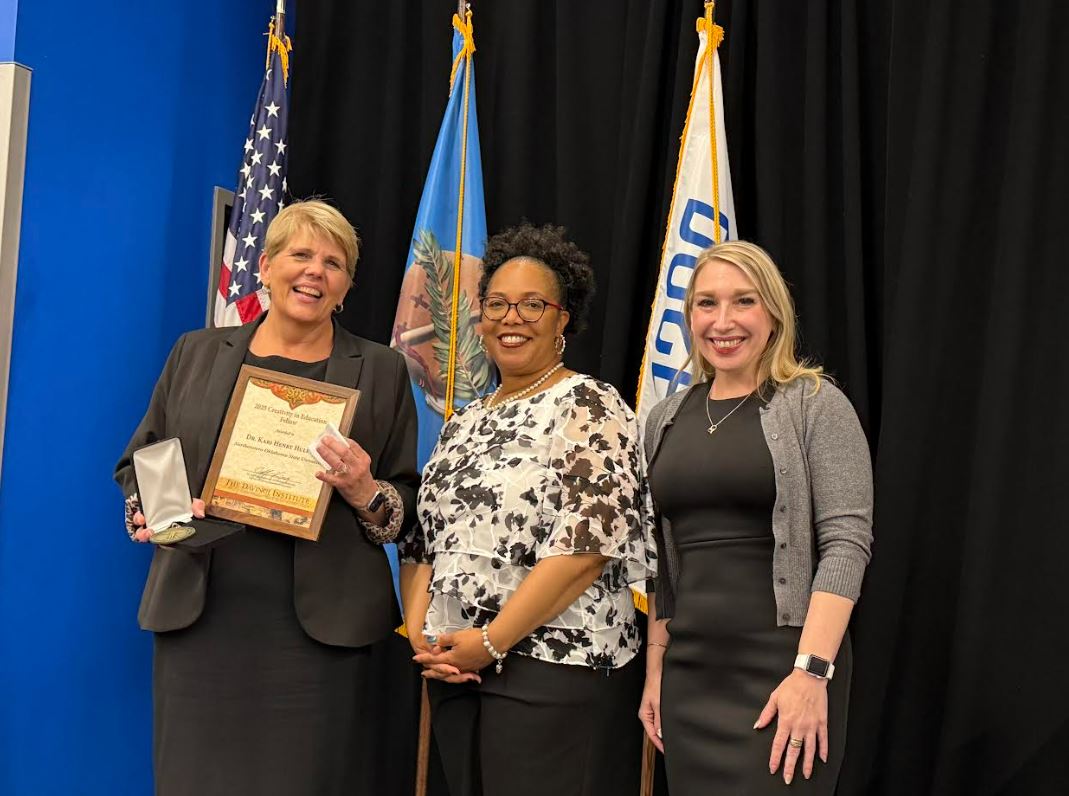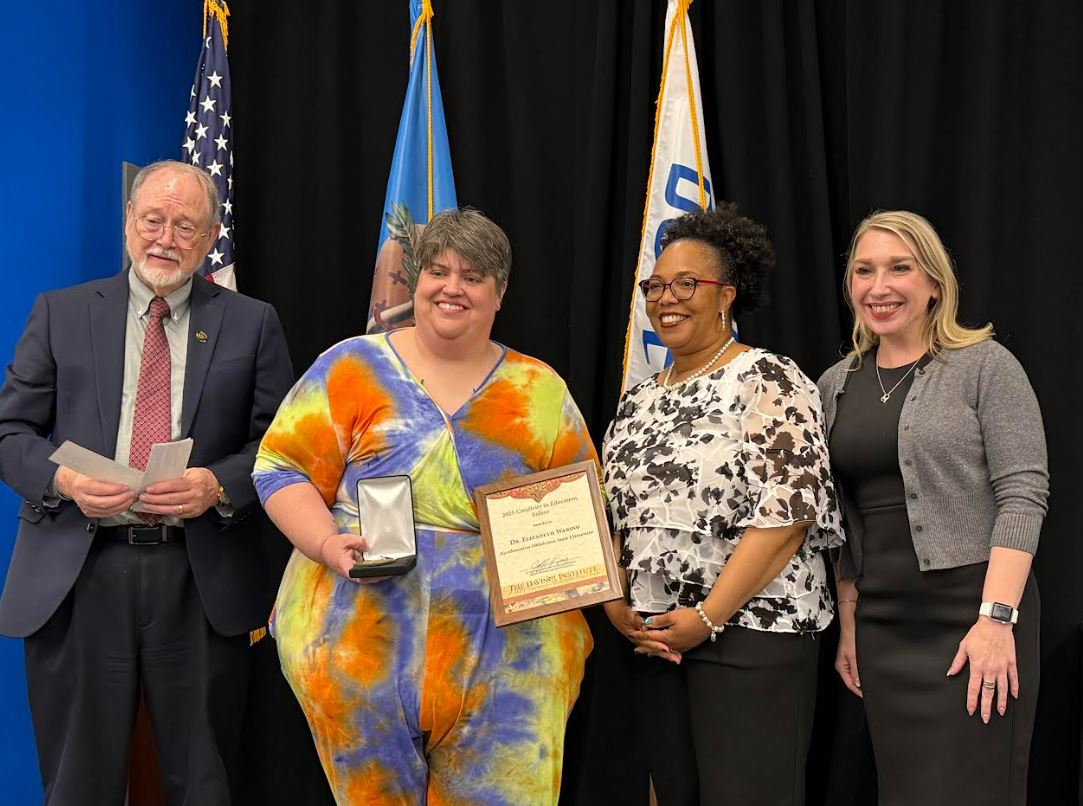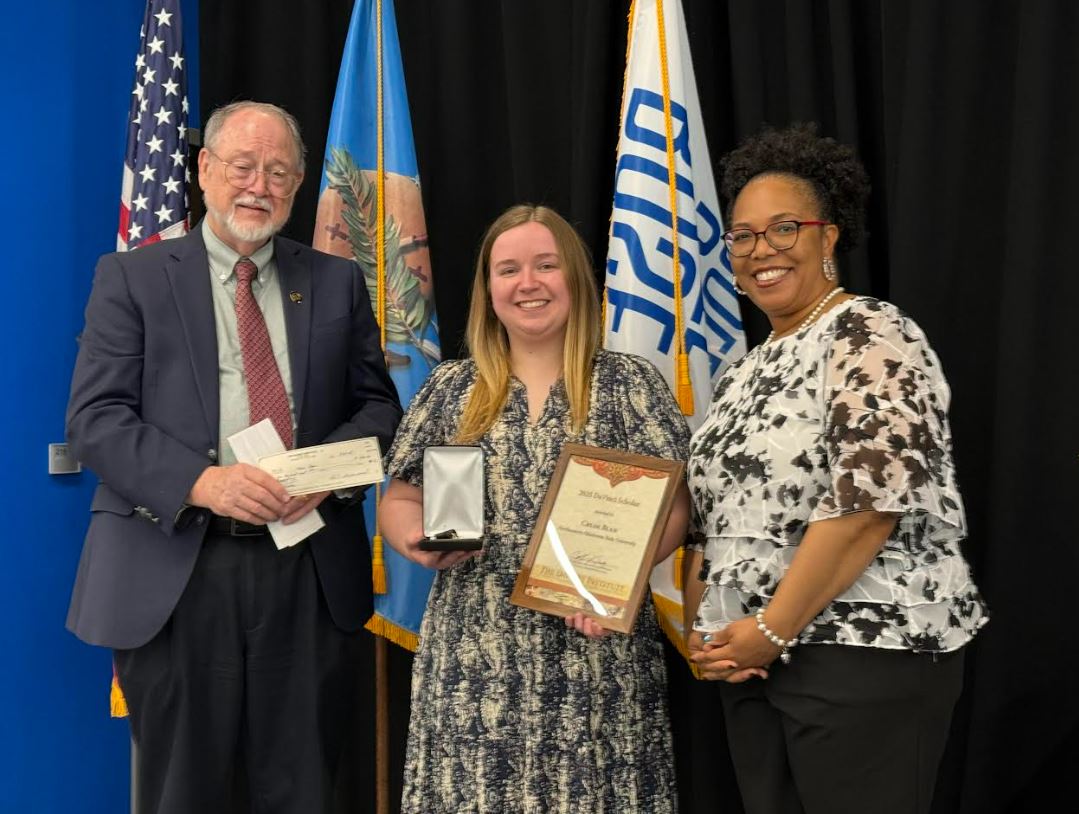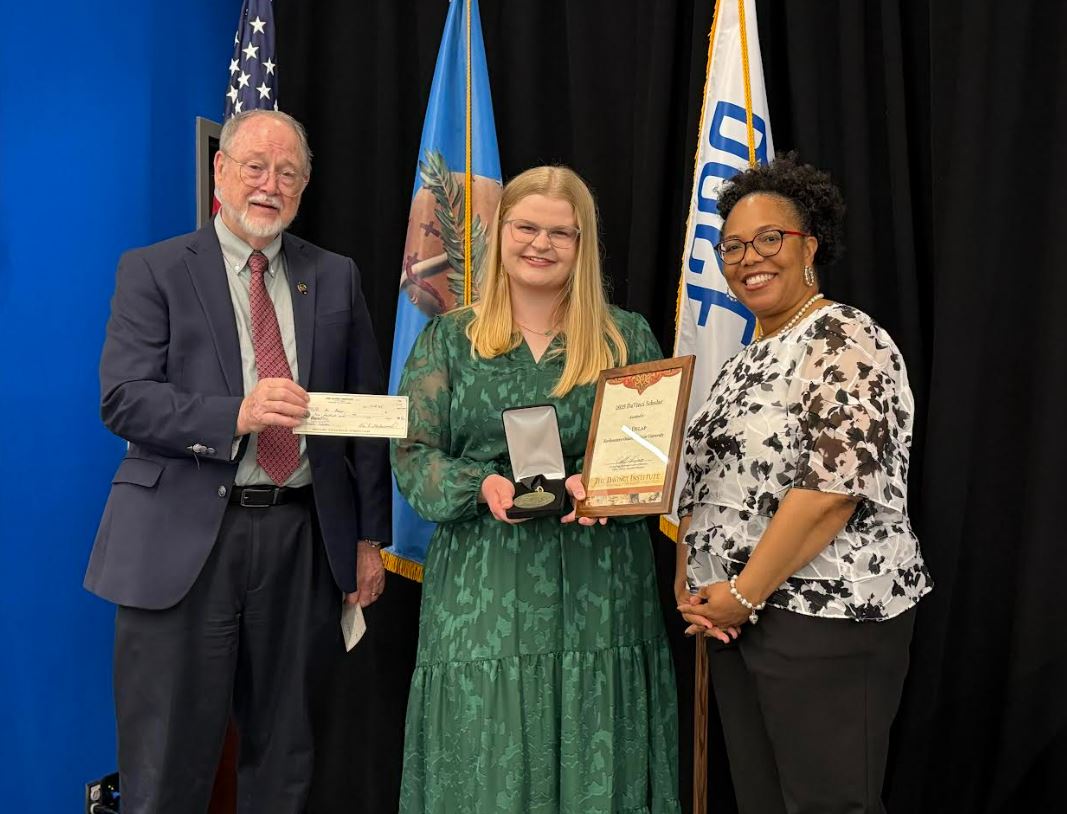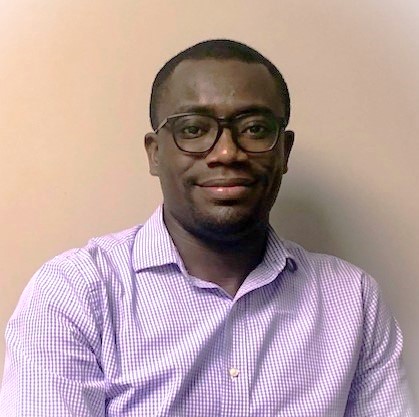DaVinci Institute Awardees at NSU
The DaVinci Institute is organized exclusively for charitable, scientific and educational purposes, more specifically to serve as an Oklahoma think tank whose mission is to promote a statewide creative renaissance through lectures, workshops, professional development, research and advocacy. The DaVinci Institute funds creative projects among Oklahoma's higher education faculty. A $1,000 grant is awarded to each DaVinci fellow to assist in completing their DaVinci proposal. (Learn more about the DaVinci Institute)
 Dr. Christopher Burba | 2025 DaVinci Fellow
Dr. Christopher Burba | 2025 DaVinci Fellow
Proposal Title: "A Nanoconfinement Approach to Designing Lithium Rechargeable Battery Electrolytes"
What is the purpose of the project?
My DaVinci Fellowship project explores a new approach to designing electrolyte solutions for advanced lithium-ion batteries. The motivation for my project comes from the serious safety issues facing modern lithium batteries. Perhaps the most significant concern is the potential for battery fires or explosions. For context, lithium batteries have three main components: a cathode (positive battery terminal, usually a transition metal oxide), an anode (negative battery terminal, such as lithium metal), and an electrolyte solution (lithium salt dissolved in a mixture of organic solvents). The problem occurs when lithium is unequally deposited across the anode surface during cell cycling. This causes fingerlike protrusions (dendrites) to form on the anode. Dendrites can traverse across the cell and create an internal short. When this happens, the battery enters thermal runaway, which may culminate with ignition of the flammable organic solvents used to make the electrolyte. It is important to emphasize that this persistent problem costs the battery industry substantial sums of money, and the associated fires are a very serious safety risk.
My project explores a completely new approach to designing lithium battery electrolyte solutions. The strategy is to confine a pure lithium salt inside the pore network of mesoporous silica. Confined substances experience profound changes in their physical properties, which notably includes melting point reduction. The amount of the reduction is inversely related to the pore diameter, so smaller pore diameters induce large melting point shifts. For example, bulk water freezes at 0°C under atmospheric pressure. However, water confined in 4-nm diameter silica pores freezes near –50°C! Confinement-induced melting point reductions are observed across a wide range of systems, including pure liquids, aqueous and organic solutions, and even ionic liquids. My hypothesis is that a lithium salt trapped inside silica nanopores will experience melting point reduction, and the magnitude of this reduction may be controlled by judiciously choosing the identity of the lithium salt or varying the pore diameter. Additional control over the melting point is possible if binary mixtures of salts are considered. This is because mixtures of components lead to lower overall melting points than either pure component. The composition with the lowest melting point is called the eutectic. Confining a eutectic mixture of two lithium salts should provide additional melting point reduction beyond that which is induced by the silica mesopores. My project explores these opportunities and has the potential to create liquid-phase lithium salts at room temperature. These materials will be inherently solvent free, which eliminates possible combustion from the flammable solvents used in lithium batteries.
What does this award mean to you?
I am humbled and honored to be selected as a DaVinci Fellow. The project I proposed is one that I’ve been thinking about for some time now, and this fellowship award will enable me to do this exciting work. I am immensely grateful to the DaVinci Institute and Northeastern State University for supporting my work as I embark on this new research direction.
Dr. Kari Henry Hulett | 2025 DaVinci Institute Creativity in Education Fellow
Proposal Title: "Fostering Creative Minds: Examining the Impact of Transformative Learning Strategies on Creativity in Online Graduate Students"
What is the purpose of the project?
The purpose of this project is to investigate how intentional course design can impact graduate students' creative and critical thinking. By reimagining discussion prompts to foster deeper engagement, unique connections, and fresh ideas, this study will explore the impact of design strategies on graduate students' creativity.
A central aspect of the project will be redesigning course discussions to encourage meaningful dialogue, while empowering students to think creatively and critically. Project activities will include developing discussion prompts that inspire diverse perspectives, spark innovative ideas, and deepen engagement among students. Guided by Mezirow's transformative learning principles, these redesigned elements will foster a richer, more collaborative learning environment. The insights gained from this study will inform future online course design strategies, placing creativity and critical thinking at the core of course design rather than as secondary considerations.
What does this award mean to you?
Receiving this award is both humbling and deeply meaningful, as it recognizes the importance of fostering creative and critical thinking in online education, which I am passionate about. It also provides the opportunity to drive further growth and innovation in online course design. This recognition motivates me to continue exploring new possibilities and enhancing student learning experiences online in transformative ways.
Dr. Elizabeth Waring | 2025 DaVinci Institute Creativity in Education Fellow
Proposal Title: "The Buffalo River: Exploring Creativity on America's First National River"
What is the purpose of the project?
This project integrates creative expression into scientific field research through a multidisciplinary field course on the Buffalo National River. The course brings together students from multiple institutions, fostering collaboration on shared scientific challenges. By combining scientific inquiry with creative practices such as field journaling, sketching, and conservation observation, the project enhances students' problem-solving skills and encourages innovative thinking. The course culminates in a multi-day canoe trip, during which students engage in hands-on data collection and develop their own research questions within a Course-based Undergraduate Research Experience (CURE) framework. This approach empowers students to take ownership of their learning, promoting leadership, creativity, and a deeper connection to the river ecosystem.
What does this award mean to you?
Receiving this award is particularly meaningful given the increasing decline of field-based learning programs at many universities. I am grateful to work at an institution that values and supports outdoor, experiential learning opportunities, such as the field course I am teaching on the Buffalo National River in spring 2025. Recognition from the DaVinci Institute helps to validate the importance of integrating creative and field-based pedagogies into science education. This acknowledgment strengthens my commitment to fostering student engagement with nature through innovative teaching methods that blend scientific exploration with artistic expression.
Ms. Chloe Blan | 2025 DaVinci Scholar
Proposal Title: "Time to Feed the Horses: Exploring Long Division Through Service"
What is the purpose of the project?
The purpose of the project is to immerse my future students in high engagement learning opportunities to make mathematics relevant. Students will experience two different types of high engagement learning opportunities that emphasize division through service. The first hands-on experience, which paves the way for the service that will follow, includes replicas of horses in stalls and replicas of flakes of hay. My students will work to distribute the flakes of hay evenly among the horses, with or without remainders. Similarly, in the second hands-on experience, my fourth grade students will work with a local horse ranch by helping them feed their horses, clean the horse stalls, and groom the horses, which will alleviate some of our community partners' daily chores, allowing them to get more work done in other areas. Most importantly, my students will take part in many division tasks around the horse barn, such as feeding and grooming the horses and cleaning out the horses’ stalls, all while they are helping our community partner.
What does this award mean to you?
I feel very honored and humbled to be chosen for this award. Coming from a small town and school, I never really thought that I could achieve an honor such as this. This award will help me to finish out my last year of college and prepare my future students for this service learning opportunity. I am grateful for Dr. Parrott and her mentorship during this project.
Ms. Avi Delap | 2025 DaVinci Scholar
Proposal Title: "Creating Doors of Opportunity"
What is the purpose of the project?
The purpose of this project is to create an opportunity for high school girls studying Algebra II to meaningfully apply their knowledge in real-world contexts through collaboration with local mothers pursuing their GED. Students will work individually with mothers to provide free math tutoring. In addition, students will create and share open access, high quality study materials aligned with GED and ACT standards. Students will deepen their understanding of math concepts and support their community while assisting mothers in achieving their educational goals and creating new opportunities for their families.
What does this award mean to you?
Receiving this award is such an amazing honor. Through the process of creating this proposal, I had the opportunity to reflect on how to provide creative, diverse, and engaging learning experiences for my future students. This award will allow my service learning dreams to become a reality. Implementing this project will both strengthen my students' understanding of algebra concepts through hands-on teaching and allow them to leave a lasting impact on their community. This is one step towards improving myself as an effective educator, and I am excited to continue seeking opportunities to develop myself.
Past NSU Recipients of the DaVinci Institute Award
We are pleased to share about our 2024 DaVinci Institute Awardees at NSU!
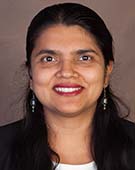 Dr. Janaki Iyer | 2024 Creativity in Education Fellow
Dr. Janaki Iyer | 2024 Creativity in Education Fellow
Proposal Title: "The Impact of Collaborations in Promoting Creative Thinking"
What is the purpose of the project?
The purpose of the project is to determine if collaborations can aid students in designing practical creative solutions. I firmly believe that if we want the upcoming generation to be adept at solving complex problems like climate change, inequity, challenges with healthcare, etc., then we need as many creative thinkers from different socioeconomic backgrounds as we can get who can work well with others. Creativity spurs innovation and we are in dire need of innovative solutions in many walks of life. Most innovative solutions that are practical come to fruition through collaborative efforts. Hence, it is important for students to have the ability to listen, share their creative ideas, and work with others to design practical innovative solutions.
As part of the project, we will design activities to evaluate the impact of collaborations on the ability of students to design creative methods to learn biological concepts and apply their knowledge to design creative solutions to a healthcare problem. We expect that these activities will promote creative, innovative, and ‘out of the box’ thinking in students, which is an extremely useful skill to have. It will also help in establishing educational practices that will not only tap into the creative potential of students but also promote collaborations among students.
What does this award mean to you?
It is a great honor to receive this award and I feel very humbled to be selected. This award has reminded me of the efforts spent by my educators and mentors who have guided and supported me throughout my professional journey. I am excited to pay this forward by not only helping them learn about concepts they need to know to be successful but do so in a manner that will foster lasting relationships with their classmates. I am filled with gratitude towards my peers and superiors for nominating me and thank the DaVinci Institute for giving me the opportunity to make learning more creative!
Dr. Renee Cowan | 2024 DaVinci Institute Fellow
Proposal Title: "Decodable Book Bags: Leveraging the School to Home Connection to Support Phonics Instruction"
What is the purpose of the project?
The purpose of this project is to investigate how building a school to home connection, through the use of take-home Decodable Book Bags, can improve phonics learning for students. The proposed project will include the creation of Decodable Book Bags built to support phonics instruction for roughly 75 First Grade students located in three Oklahoma classrooms. The phonics skills will be selected from the scope and sequence located within the reading curriculum, as well as teacher input.
The Decodable Book Bags will contain the following items:
- A plastic parent folder containing directions for all phonics games/activities, a description of the phonics skill; a description of fluency strategies used to read the decodable books (such as echo reading), as well as potential comprehension questions for each book;
- A cardstock, laminated postcard containing a QR code for a parent questionnaire;
- 5-7 fiction and nonfiction decodable books, all of which will be focused on the same phonics skill; and
- 2 phonics games/activities that further support the phonics skill. All materials to play the game will be included within the bag.
While the Science of Reading encompasses a large body of work centered on all components of reading, many studies describe the effectiveness of explicit and systematic phonics instruction as a means of supporting our earliest readers (Bowers, 2020). As teachers continue to support students with phonics instruction in the classroom, this project will allow important phonics practice to continue at home. Parents often hope to help their child/children be successful in school but do not always know how to do so. With carefully curated Decodable Book Bags, parents no longer have to guess what to do.
What does this award mean to you?
It is a huge honor to receive the 2024 DaVinci Fellow award. I am humbled to be included among such creative and dedicated scholars who have gone before me. Ever since I first stepped foot into the classroom as a new teacher, literacy has always been my passion. I have dedicated my career to improving the quality of literacy education our students receive. Literacy is arguably the Civil Rights issue of this generation. With so many students lacking basic literacy skills, this project allows me to make a positive impact on student learning both in and out of the classroom. Without this award, this impact would not be possible. Thank you to the DaVinci Institute and Northeastern State University for supporting my research.
Dr. Samuel Asante | 2024 DaVinci Institute Fellow
Proposal Title: "The BRIDGE Mentoring Project"
What is the purpose of the project?
The proposed project is called The BRIDGE Mentoring Project. BRIDGE stands for Build, Restore, Initiate, Develop, Grow, and Empower. BRIDGE will seek to enhance college and career readiness among high school students from low-income households in the Tulsa Public School system and connect them to some of Tulsa’s most influential leaders who could serve as role models to them. The project will also seek to spark meaningful relationships that would help strengthen student's ability to build strong networks (with individuals and organizations) and a social capital to achieve their college and career goals.
The issue of poverty has continued to plague the United States and restrain further growth. In 2021, it was estimated that 11.6 percent of Americans (37.9 million) were living in poverty. For young people (i.e., individuals 18 years and under), this number was unusually high, with 15.3 percent reported to be living in poverty (US Census Bureau, 2023). Additionally, poverty rates were found to be higher among minority children (Blacks (19.5%), Hispanics (17.1%), American Indians and Alaska Natives (24.3%), and Asians (9.3%)) than Whites (10.0%) (US Census Bureau, 2023). A recently released state-level data on poverty and health revealed stunning numbers about poverty in the state of Oklahoma. According to the data, in 2022, poverty rate in Oklahoma was 15.7%, compared to the national poverty rate of 11.5%, making Oklahoma the 8th most impoverished state in the country. The data also showed 1 in 5 Oklahoma children lived at or below the federal poverty threshold in 2022 (France, 2023).
Children who grow up in households classified as impoverished often face challenges and experience unintentional cultural, environmental, and educational effects than do their peers from middle- to high-income households (Johnson, 2017). Compared to their peers from middle- to high-income households, students from lower-income homes lag behind in such areas as enrollment in core and advanced courses, scores on standardized tests (e.g., SAT, ACT), and high school graduation rates (Johnson, 2017; Mineo, 2023). The high school dropout rate is considerably higher among them, and the readiness of those who transition to higher education or enter the workforce is subpar (Johnson, 2017; Mineo, 2023). Evidence- and practice-based college and career interventions are needed to address these achievement gaps, but for children in poverty, it is essential to focus specifically on providing them with college and career readiness strategies to make them as competitive as their peers from high-income homes. For youth of color and those from poor economic backgrounds, research has shown that mentoring programs can have a meaningful impact on their college or career readiness (Bruce & Bridgeland, 2014; Sanchez, 2016; Wimer & Bloom, 2014).
Research indicates that low-income and low achieving students who have mentoring guidance throughout their academic careers perform significantly better, have higher graduation rates, and advance to post-secondary schools (Bruce & Bridgeland, 2014; Wimer & Bloom, 2014). Bruce and Bridgeland noted in their work that at-risk youth who are mentored are more likely to engage in productive and beneficial activities. These activities, as they remarked, “translate into higher self-esteem and self-confidence that are necessary traits for youth to engage in teamwork and community work, and to be successful in life” (p. 6).
BRIDGE Mentoring is the result of years long collaboration, initiated by Dr. Samuel Asante in 2017, between Northeastern State University (NSU) School of Social Work (SSW) and Growing Together, a community organizing agency that guides and supports community residents, organizations, and funders to create vibrant community for children in the Kendall Whittier neighborhood of Tulsa. Considered a community quarterback, Growing Together aims to create pathways for children to break the cycle of poverty through education, community vibrancy, and built environment. It achieves this aim by working with multiple education institutions and programs, financial organizations, and home builders and developers (Growing Together, n.d.). Growing Together and its affiliates have, over the years, provided a platform for training macro social work students in NSU SSW. BRIDGE Mentoring will offer NSU SSW students the opportunity to be involved in preparing high school students for college and career.
BRIDGE Mentoring Program will be a collaborative effort between NSU School of Social Work and Communities in Schools (CIS - Tulsa Chapter), a Growing Together affiliate. Through CIS, NSU SSW will partner with Tulsa Public School (TPS) to identify students from low-income backgrounds who could benefit from the program to join. Together, all three organizations will work to identify primary areas of need (as they relate to college preparation and career readiness), eliminate barriers, and build systems to ensure students have the information, tools, and support to begin the next phase of their life journey.
BRIDGE will enlist the support of parents without whom the work of preparing students for college and career will be extremely challenging.
The BRIDGE Mentoring Project will focus on relationship-building among the local community and the program partners (NSU SSW, CIS, and TPS). The mentoring project recognizes that the success of students in school and later in life is a community-wide effort with multiple players, all addressing specific identified needs of students. Partners to work will include corporations, organizations and agencies that might serve as arenas that not only challenge and motivate students to strive for the best but also offer platform that contribute to students’ career development.
The research base is strong, the need is clear, and the field is ready. As evidence suggests, much of the academic and career readiness concerns of young people can be met through the support and continued collaborative efforts of families, schools, community organizations and leaders, businesses, and young people themselves. It is hoped that BRIDGE Mentoring will offer an avenue that brings together these important partners to support young people, particularly those at-risk, as they prepare for the future.
References: Available upon request.
What does this award mean to you?
It is a great honor to be named the 2024 DaVinci Fellow. I am grateful to the DaVinci Institute and Northeastern State University for recognizing my work and the importance of the project I intend to undertake to assist high school students from low-income families with their preparations for college and career. This recognition motivates me to continue striving for excellence in my field.
A great movie actor was once asked about his dream in life, to which he responded, “I don’t know…I don’t have a clue…I don’t know if I have my own dream.” He later added, “but I do know I can help others fulfill theirs.” If I were asked this same question about my dream, my answer would probably be the same as this actor’s. With this award, however, I know that even if I don’t have a dream of my own, I can, at least, help a child in Kendall Whittier achieve their life dream. And that counts for something.
Jocelyn Holden| 2024 DaVinci Institute Scholar
Proposal Title: "Reading and Writing Together Project"
What is the purpose of the project?
The purpose of the project is to create a meaningful and enriching literacy experience
for students by partnering them with residents from a nearby retirement community.
Through one-on-one interactions, students will have the opportunity to share their
favorite books, engage in collaborative reading sessions, and create a published story
to gift to their resident partners. These activities can enhance students' literacy
skills while fostering intergenerational relationships between students and residents.
What does this award mean to you?
Receiving this award is an immense honor for me. I am passionate about offering students diverse and engaging opportunities for learning. With this award, I will be able to realize my vision of extending learning beyond the classroom through a service-learning project. Implementing this project will not only benefit my students academically but will also foster meaningful connections between them and the residents of our community.
We are pleased to share about our 2023 DaVinci Institute Awardees at NSU!

Dr. Sophia Burch | 2023 DaVinci Institute Creativity in Education Fellow
DaVinci Fellow Proposal: Teaching for Creativity by Teaching Creatively
What is the purpose of the project?
The purpose of this project is to investigate the impact of my creative teaching on
K-12 teachers' perceptions of their own ability to teach creatively. “Teaching for creativity is more likely to emerge from contexts in which teachers are teaching creatively…. Learners model themselves on their teachers' approach, find themselves in situations
where they are able to take ownership and control and are more likely to be innovative,
even if the teacher was not overtly planning to teach for creativity” (Jeffrey & Craft,
2004, p. 84, emphasis mine). The authors of a report by the National Advisory Committee
on Creative and Cultural Education (NACCCE, 1999) distinguished between teaching creatively
and teaching for creativity, yet articulated the inextricable nature of the two, stating
“teaching for creativity involves teaching creatively” (NACCCE, 1999, p. 90). The
quote that opens this paper captures Jeffrey and Crafts assertion that the two are
integral, and that teachers who teach creativity are likely to foster creativity in
their students, even if inadvertently.
A rich body of literature demonstrates the importance of the instructor modeling best practices in teacher preparation courses, particularly when the instructor explicitly calls the students (future teachers) attention to the best practices used (see Moore & Bell, 2019 for an extensive literature review). Several evidence-based teaching and assessment practices demonstrated to significantly and positively impact the learning outcomes of diverse students include providing feedback, using cues, questions, and advance organizers, cooperative learning, assigning homework and providing practice, and the use of non-linguistic representations, among others (Dean, Hubbell, Pitler, & Stone, 2012). The use of innovative teaching methods positively impacts student achievement, motivation, and problem-solving ability (Huang, Ko, & Chen, 2020; Rinkevich, 2011). Teachers who have creative self-efficacy are more likely to employ creative teaching methods and support creativity in their own students (Nemeržitski & Heinla, 2020).
The proposed project involves bringing the variety of creative and evidence-based pedagogical practices and assessment methods I model throughout an asynchronous online graduate course in measurement and assessment to the teachers attention through brief “call-outs” adjacent to the teaching strategy. Participants will complete the Teaching for Creativity Scales at the beginning and end of the class, a questionnaire designed to capture teachers perceptions of the factors that influence their ability to teach creatively (Rubenstein, Coach, & Siegle, 2013). Participants will also complete open response items, written by me, which are designed to capture the teachers perceptions of how creative the teaching practices were, the impact of the teaching method call-outs on the likelihood that they will use the methods in their own teaching, and their self-efficacy regarding their ability to teach creatively.
References available upon request.
What does this award mean to you?
I have had the privilege of attending past DaVinci Award Celebrations and hearing
about the impactful projects my colleagues across the state have proposed and implemented.
It is humbling to be among this group of creative problem solvers. I am excited to
have this opportunity to infuse even more creativity into my own teaching, and to
explore the impact on classroom teachers. Many heartfelt thanks to the DaVinci Institute
and Northeastern State University for supporting my project, and for my Department
Chair, Dr. Jim Ferrell for believing in it enough to recommend me for the award.
Alessandra Criscione | 2023 DaVinci Institute Scholar
Proposal Title: "Inspiring Girls to Choose STEM"
What is the purpose of the project?
My project is titled "Inspiring Girls to Choose STEM" and it is centered around an all girls secondary math class that partners with local Girl Scouts within the community to give my students an opportunity to lead STEM related activities to these younger scouts. This will inspire both groups to go into STEM related career fields, where female representation is lacking.
What does this award mean to you?
This award is meaningful to me because growing up as a Girl Scout, I was taught to dream big, break gender roles, and to be a leader. This award allows me to implement my project into my future classroom and hopefully inspire young girls and Girl Scouts the way that Girl Scouts inspired me as a kid.
Jennifer Terry | 2023 DaVinci Institute Scholar
Proposal Title: "I Spy Math in the Library."
What is the purpose of the project?
The purpose of the project is using the engagement provided by games to deepen students'
understanding of mathematics operations and concepts.
The project is planned around my future middle school classroom. By the time students get to middle school, the mathematics concepts they are encountering are becoming more and more complex and class times are limited. There may be less time for middle school students to engage in games. This can make approaching mathematics more intimidating. In this project, my middle school students would select a trade book and then develop a mathematics activity or game based on that book to share with children in a local public library. In addition to developing the game, students would also develop a parent information flier with a QR code, giving parents access to online resources to help them continue exploring the concept with their children at home. The original design of the project would take an entire semester to implement. During the course of the semester, students would reflect on the project through individual journals and also collectively through reflective videos on a Flipgrid board. At the conclusion of the project, a celebration would be held. Representatives from the school and the public library system would be invited to celebrate with my students.
My students would benefit from deepening their understanding of the mathematics concept. Young children in the community would benefit from working with older children (who could be seen as role-models). Parents in the community would benefit from having quality mathematics resources to share with their children at home.
What does this award mean to you?
This award means so much to me. As a student at NSU, I have the privilege to observe
many outstanding educators. They inspire me to think bigger and try harder. When I
was nominated by Dr. Massey and Dr. Parrott to submit a proposal for this award, I
was unsure whether I would be able to write a winning proposal. Through their encouragement
and with the encouragement of other members of the faculty here at NSU BA, I took
this chance and wrote a proposal that spoke to my passion for teaching.
Considering entering the teaching profession can be very intimidating right now. Being selected for this award helps me have some confidence in my calling as well as my abilities.
We are pleased to share about our 2022 DaVinci Institute Awardees at NSU!
Read their project information below!
Dr. MooSong Kim | 2022 DaVinci Institute Creativity in Education Fellow
Project Information
What is the title of the proposal?
School Principals and PE Teachers Facilitators and Barriers to Adopting and Implementing an After-School Physical Activity Policy for Children with Disabilities
What is the purpose of the project?
The purpose of this study is to examine factors affecting school principals and PE teachers adoption and implementation of a policy regarding after-school physical activity participation to promote children with disabilities physical activity. The U.S. Government Accountability Office (GAO) found that schools did not offer students with disabilities an equal opportunity to be involved in school-based extracurricular sport and physical activity. Furthermore, recent studies found that there is still discrepancy in school-based extracurricular sport and physical activity participation between children with and without disabilities after releasing a policy (i.e., a Dear Colleague Letter) to minimize the gap of participation in after-school physical activity between children with and without disabilities in 2013. Therefore, the study aims to explore school principals and PE teachers facilitators and barriers to adopting and implementing the DCL.
What does this award mean to you?
It is a great honor to receive the 2022 DaVinci Creativity in Education Fellow. I am grateful to the DaVinci Institute and NSU for supporting my research project aiming to promote children with disabilities physical activity. This fellowship award recognizes my passion for promoting physical activity for all. I strongly believe that this fellowship award will enable me to take a small step toward achieving the goal. Again, thank you the DaVinci Institute and NSU for supporting this research project.
Kaylee Potter | 2022 DaVinci Institute Scholar
Project Information
What is your proposal title?
Healthy Living Project
What is the purpose of the project?
What does this award mean to you?
Ashley Titsworth | 2022 DaVinci Institute Scholar
Project Information
What is your proposal title?
Algebra II Students Serve through ACT and GED Resource Development
What is the purpose of the project?
The purpose of my project is to have my Algebra II students work in groups to create study materials for the mathematics portion of the ACT. These resources when completed will be shared with the Tulsa City-County Library to be distributed to anyone seeking free study materials for the mathematics portion of the GED.
What does this award mean to you?
When I was in high school I had no clue what to expect when I went to take the ACT. I would like to help future students by at least making studying for the mathematics portion of the ACT part of their curriculum. Working together weekly they will have the chance to look back at all the material they have learned up to and including Algebra II to be better prepared when the time comes. These resources will also aid people in our community that are preparing to take the mathematics portion of the GED. Many resources are available to these people, but the ones made by my class will be completely free. This award means I will be able to implement this idea when I start teaching, and my students won't feel like they are going in blind when they take the ACT.
We are pleased to share about our 2021 DaVinci Institute Awardees at NSU!
Dr. Jericho Hobson, DaVinci Institute Fellow
Dr. Meagan Moreland, DaVinci Institute Fellow
Dr. Sarah Ramsey, DaVinci Institute Creativity in Education Fellow
Amber Quammen, DaVinci Scholar
Read their project information below!

Dr. Jericho Hobson | Assistant Professor Curriculum Instruction BA
Proposal Title - Urban Engagement: Increasing Exposure and Support to Increase Interest in STEM
hobsonjl@nsuok.edu | 918-449-6583
What is the purpose of the project?
The proposal for this fellowship funding is threefold. First, it provides experiences for Northeastern State University's Teacher Candidates to gain additional experience and more comfort in supporting STEM learning activities. This has the potential to influence their own future classrooms and impact the STEM curriculum incorporated for their future students and entice their students to seek more STEM opportunities. It will also provide opportunities for the current public school teachers to observe the workshops and see how their students are engaged in STEM activities. These teachers will witness how the NSU Teacher Candidates facilitate student critical thinking and problem solving through questioning and prompting. They will also see how the STEM curriculum can be integrated into various required daily curriculum content. These observations and participation may provide more comfort in executing the STEM curriculum in their own classrooms. Cohen (2018) discusses there is a direct correlation between teacher comfort and student achievement related to STEM curriculum. Through his research, he found that when teachers exhibit low efficacy related to STEM education students achievement decreases and further interest also declines.
Secondly, this proposal provides workshops with fun and engaging STEM learning opportunities for area urban public school students. This has the potential to influence their interest and motivation toward STEM as they progress through the next phases of their academic learning. Robnett and Leaper (2012) explain that individuals become interested in STEM activities and potential careers through motivation and social norms. Providing opportunities for students to engage and experience STEM alongside their peers has the potential to increase their interest in these activities and potential careers. “If a students friendship group values STEM, it may strengthen his or her interest and commitment to a STEM career path” (p. 653).
Lastly, students will hold a STEM Fair at Tulsa Legacy Charter School for their fellow students and family to attend. At this STEM Fair, they will demonstrate their learning and educate others on the information they have learned during their STEM workshops. This has the potential to create more interest in STEM for their friends and family members and cultivate support for their own interest in STEM activities and experiences. Simpkins et al. (2018) suggest that parents support can strengthen students motivational beliefs, especially as it relates to academic efforts and achievements. Their research goes on to explain that when parents “believe their child possesses high abilities are more likely to have children with high motivational beliefs in both science and math” (p. 1205). This reinforces the idea that parent support of STEM interests and activities is influential on students' interest and motivation for related experiences.
What does this award mean to you?
Receiving this award is an honor and accomplishment I did not anticipate, though I hoped for it. I am humbled and excited to be able to represent NSU and join the other amazing educators that have previously received this award or nomination. I am also thrilled that the NSU Teacher Candidates and I will be able to have a direct impact on the students at our partnership school, Tulsa Legacy Charter School, as we conduct stem workshops for students and teachers and support the students as they then demonstrate what they have learned to their friends and family. This award is a big win, not just for me, but also for our NSU Teacher Candidates, the public school students and teachers, and the students' friends and family.
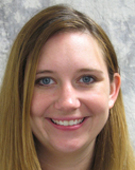 Dr. Meagan Moreland | Associate Professor Curriculum Instruction BA
Dr. Meagan Moreland | Associate Professor Curriculum Instruction BA
Proposal Title - Developing a Robust Pipeline from High School Student to Future Oklahoma Educator
morela02@nsuok.edu | 918-449-6441
What is the purpose of the project?
The purpose of my proposal has many facets. First, I have an already created course for the pre-phase of my DaVinci project. This course focuses on high school seniors who think they may want to become educators. I feel this course is an amazing platform and start to the innovation I want to continue for this project. In my first phase, I have two approaches to employ. I want to create new partnerships with additional school districts to increase my class size, thus potentially having a bigger impact on encouraging students to become future Oklahoma educators. I have targeted two districts that are near to begin. Another large district has agreed to partner in 2022. Essentially, I want to create district integration purporting collaboration to break down the “walls” of districts to focus on serving as many high school students as possible. While working on expanding, I will work on implementing innovative components into the current course. This includes teaching the students about different school settings such as virtual and face-to-face. We will engage in both so they will be prepared to teach in many formats. The second approach is to have at least one point of contact per semester with my former students (from the course I am now teaching). I would use the funding from this project to purchase something to encourage their potential of wanting to become a teacher. For instance, a book, teaching supplies, etc. I feel this gift and point of contact will help continue to build this mentoring relationship.
What does this award mean to you?
Receiving the DaVinci award is an esteemed honor. This award recognizes my passion for helping educator attrition rates and encouraging people to join in the ranks as Oklahoma educators. Being able to expand a project I am so passionate about is rewarding, as my hope is to inspire a new generation of educators and highlight the benefits of this amazing career. Previous DaVinci winners are people who have mentored and inspired me over the years. Winning this award beside them is not something I ever anticipated, yet I am forever grateful for their support and encouragement.
Dr. Sarah Ramsey | Associate Professor Curriculum and Instruction
Proposal Title - Project Nurture Nonfiction: Equipping Community Educators to Support Young Readers Through Creative Nonfiction Read-Alouds
ramseyse@nsuok.edu | 918-444-3716
What is the purpose of the project?
Research confirms that the purposeful and prominent inclusion of nonfiction texts in the curriculum provides invaluable engagement opportunities for young children (Stead, 2014). However, to be most effective, nonfiction texts “...should be accompanied by rich discussions, opportunities for retellings, and re-readings” (Stead, 2014). Therefore, the goal of this project is not only to communicate the value of nonfiction read-alouds to early childhood educators - and eventually to librarians and parents in the community - but also to share engaging nonfiction book selections and accompanying hands-on interactions that will stimulate and strengthen early literacy development and skills in young children. Furthermore, this project is intended to provide insight on how to best support teachers in creating classroom interactions that engage young children in rich discussions, retellings, and rereadings with nonfiction read-aloud texts. To that end, I plan to employ the following creative approaches, including: designing an interactive professional development presentation that brings about a paradigm shift in how early childhood educators use nonfiction - specifically during read-aloud interactions, introducing early childhood educators to the tactile and interactive Book Box instructional strategy and supporting them in creating their own book boxes, as well as conducting this professional development via Thinkific, a virtual and self-paced learning platform.
What does this award mean to you?
It is an honor to be named the 2021 DaVinci Creativity in Education Fellow and to share this distinction with so many peers whose work I admire. I am grateful to the DaVinci Institute and Northeastern State University for their support in furthering the work of nurturing creative nonfiction read alouds. This fellowship award will enable me to equip educators and parents to open up the magic and mystery of the world of nonfiction and impact the newest generation of historians, mathematicians, scientists, and writers.
Anne Heine | 2021 DaVinci Scholar
Proposal Title - Mathematics Citizens
What is the purpose of the project?
Playing mathematics games makes math meaningful to students. It deepens their understanding and reasoning of number sense and operations by encouraging strategic thinking and allowing a repeated practice that supports computational fluency. Project Mathematics Citizens will not only provide an opportunity for my 5th grade Bixby students to formulate and create math games using manipulatives, digital resources and various other resources in their own classroom, but also create duplicate games to share with other 5th graders at The Learning Center After-School Program in The Common Good Northwest Tulsa Hub. The Learning Center After-School Program offers homework help to K-5th grade students and is looking for ways to strengthen their students math abilities, especially their 5th grade students. My students will have a scheduled meeting with the State Representative from their district, Sheila Dills. Representative Dills will discuss the importance of citizens engaging in their community. Upon completion of my student's math unit project, they will deliver the games they created for The Learning Center After-School Program and have a celebration that includes playing math games with the 5th graders in the After-School Program.
What does this award mean to you?
I want my students to love mathematics and plan to teach math by making real-life and creative connections to their instruction so they discover math is everywhere. This award provides an opportunity to show my students sharing mathematics provides positive peer interactions within their community.
Amber Quammen | 2021 DaVinci Scholar
Proposal Title - “Project Community Garden and Compost Site”
What is the purpose of the project?
The purpose of this project is for students to create a garden and compost site. Students will have the opportunity to use skills they are learning in Math and Science classes to create a blueprint layout for a garden bed, learn to abstract soil samples and read them to discover what minerals need to be added or depleted for growing, as well as discovering recipes for the perfect compost. They will partner with the community and develop a recycling zone to create the compost and reduce waste for landfills. Once the garden is complete a community harvest celebration will be planned so that everyone can share and enjoy the produce.
What does this award mean to you?
This award is providing me the opportunity to allow my future students the chance to apply what they are learning in the classroom in a meaningful way. It also allows the community to partner with students to create a recycling and compost site. This will provide students with a sustainable source of nutrients for their plants and reduce waste within the community. At the end of the growing season, we will get to experience together the learning that took place and celebrate with the vegetables and fruit students grew. Winning this award is providing me with the chance to make a difference in my community in ways I had not thought about before.
We are pleased to share about our 2020 DaVinci Institute Awardees at NSU!
Dr. Richard Hasenauer, 2020 DaVinci Fellow
Dr. Sapna Das Bradoo, 2020 DaVinci Fellow
Dr. Spence Pilcher, 2020 Creativity in Education Fellow
Ms. Jessica Abuelaileh, 2020 DaVinci Scholar
Read their project information below!
Learn more about our 2020 DaVinci Fellows, their proposals and how their grants will be used by clicking on the link below.
We are pleased to share about our 2019 DaVinci Institute Awardee at NSU!
Chris Miller, DaVinci Fellow
Read their project information below!
Learn more about our 2019 DaVinci Fellow, proposal and how the grant will be used by clicking on the link below.
We are pleased to share about our 2018 DaVinci Institute Awardees at NSU!
Dr. Tobi Thompson, DaVinci Fellow
Dr. Ratnakar Deole, DaVinci Fellow
Jeannie Morrow, DaVinci Scholar
Read their project information below!
Learn more about our 2018 DaVinci Fellows, their proposals and how their grants will be used by clicking on the link below.
2017
- Dr. Dilene Crockett, DaVinci Fellow
- Barbara Fuller, DaVinci Fellow
- Steven Woolf, DaVinci Scholar
- Tabytha Russell, DaVinci Scholar
2016
- John deBanzie, DaVinci Fellow
- Dr. Bea Keller-Dupree, DaVinci Fellow
2015
- Dr. Stephan Sargent, DaVinci Fellow
- David Dotson, DaVinci Scholar
2014
- Mary Swanson, DaVinci Fellow
- Amanda Jesperson, DaVinci Scholar
2013
- Rebecca Maness, DaVinci Scholar
2012
- Taylor Sawyer, DaVinci Scholar
2011
- Avery Chambers, DaVinci Scholar
2010
- Linda Wilson, DaVinci Fellow
2009
- Amy Aldridge-Sanford, DaVinci Fellow
2007
- Dr. Martha Parrott, DaVinci Fellow
2006
- Kippi Wyatt, DaVinci Fellow

